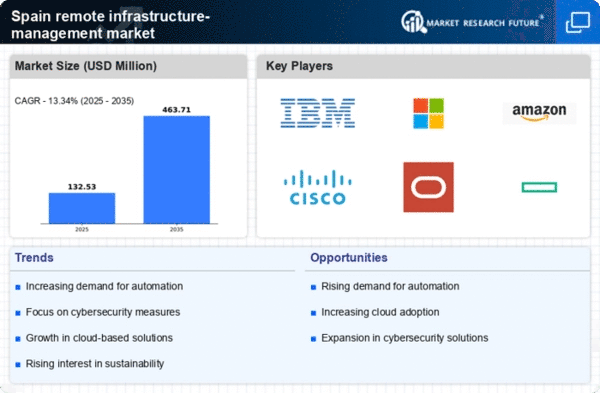Growing Demand for Cost Efficiency
the remote infrastructure-management market in Spain is experiencing a surge in demand for cost efficiency. Organizations are increasingly seeking ways to optimize their operational expenditures, which has led to a heightened interest in remote management solutions. By leveraging these solutions, companies can reduce the need for on-site personnel and minimize travel costs, thereby achieving substantial savings. According to recent data, businesses that implement remote infrastructure management can potentially reduce their IT operational costs by up to 30%. This trend is particularly pronounced among small to medium-sized enterprises (SMEs) in Spain, which often operate with tighter budgets. As a result, the drive for cost efficiency is likely to continue shaping the remote infrastructure-management market, encouraging further investment in innovative technologies that facilitate remote operations.
Shift Towards Hybrid Work Environments
The shift towards hybrid work environments is reshaping the remote infrastructure-management market in Spain. As organizations adapt to new work models, the demand for remote management solutions that support both on-site and remote employees is increasing. This transition necessitates the implementation of flexible infrastructure management systems that can accommodate diverse work settings. Recent surveys indicate that over 60% of companies in Spain are planning to adopt hybrid work models, which in turn drives the need for effective remote management solutions. The market is likely to expand as businesses seek to enhance collaboration and productivity while ensuring seamless access to resources. Consequently, the shift towards hybrid work environments is a crucial driver for the remote infrastructure-management market, influencing investment decisions and service offerings.
Regulatory Compliance and Data Protection
In Spain, the remote infrastructure-management market is significantly influenced by the need for regulatory compliance and data protection. With stringent regulations such as the General Data Protection Regulation (GDPR) in place, organizations are compelled to adopt robust remote management solutions that ensure compliance with data privacy laws. This necessity creates a substantial market opportunity for service providers who can offer secure and compliant infrastructure management services. The market is projected to grow as companies prioritize data protection, with an estimated increase of 25% in demand for compliant remote management solutions over the next few years. Consequently, the emphasis on regulatory compliance is a critical driver for the remote infrastructure-management market, as businesses strive to mitigate risks associated with data breaches and legal penalties.
Increased Focus on Sustainability Initiatives
In Spain, there is a growing focus on sustainability initiatives that impact the remote infrastructure-management market. Organizations are increasingly recognizing the importance of reducing their carbon footprint and adopting environmentally friendly practices. Remote infrastructure management solutions can contribute to these sustainability goals by optimizing resource usage and minimizing energy consumption. For instance, companies that implement energy-efficient remote management systems can potentially reduce their energy costs by up to 15%. This trend aligns with the broader societal push towards sustainability, prompting businesses to invest in technologies that support eco-friendly operations. As a result, the emphasis on sustainability initiatives is likely to drive growth in the remote infrastructure-management market, as organizations seek to balance operational efficiency with environmental responsibility.
Technological Advancements in Remote Monitoring
Technological advancements play a pivotal role in shaping the remote infrastructure-management market in Spain. Innovations in remote monitoring tools and platforms enable organizations to manage their IT infrastructure more effectively and efficiently. The integration of advanced analytics, IoT devices, and real-time monitoring capabilities allows for proactive management of systems, reducing downtime and enhancing performance. As businesses increasingly recognize the value of these technologies, the market is expected to witness a growth rate of approximately 20% annually. This trend is particularly relevant for industries such as telecommunications and finance, where uptime and reliability are paramount. Thus, the continuous evolution of technology serves as a significant driver for the remote infrastructure-management market, fostering a competitive landscape that encourages further innovation.
















